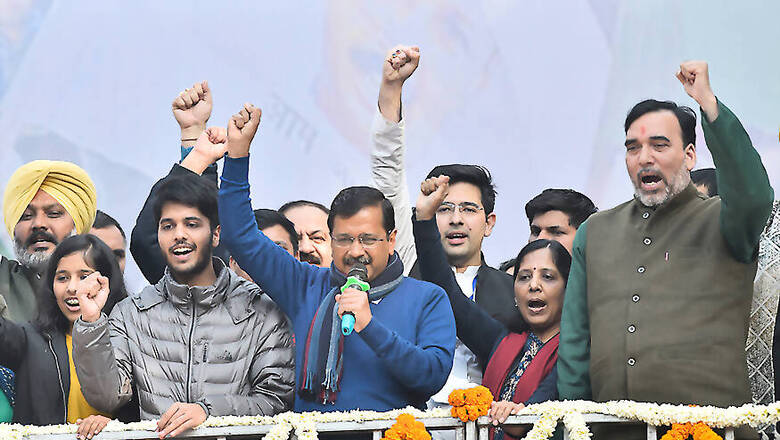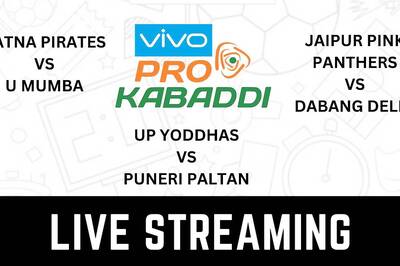
views
Completing a hat-trick by winning the Delhi Assembly election, Arvind Kejriwal has cemented for himself a much stronger position and revived talk of his prime ministerial ambitions. Most politicians aspire for the top post whether they deserve it or not, and Kejriwal is no exception.
A man who believes in building a personality cult around him certainly believes that he is suitable for the post. “Who knows” was his reply in one of his interviews when asked about whether he wanted to become the PM.
He had planned to become the Delhi chief minister in 2013, move on to a bigger state like Punjab in 2017 and broad base the AAP in other states like Gujarat, Rajasthan and Chhattisgarh to position himself as a challenger to Modi in 2019 Lok Sabha polls.
But things did not go according to his plan. He lost the plot midway and ended up in a roller coaster ride in the rough and tumble of politics.
Fresh indications of his national ambition emerged on Tuesday with posters appearing in the AAP office in the morning itself. They featured a big photograph of Kejriwal with a caption asking people to connect with the party for national affairs.
So Kejriwal let the cat out of the bag even before the results of the Delhi elections were announced. He is now talking of Bharat and not just Delhi.
Kejriwal is a very ambitious man. He had shown this trait since the days of his involvement with Anna Hazare’s India Against Corruption movement. He launched the AAP against the advice of his mentor Hazare. Although Kejriwal claimed in his book ‘Swaraj’ that he never wanted to be even a minister, that craving for power was evident all throughout.
When he launched the AAP, many dismissed it as an upstart party and laughed when he aspired to become the chief minister of Delhi in 2013. Kejriwal formed the government with the support of the Congress, but AAP lost its sheen within months when Kejriwal resigned and President’s rule was imposed.
People were fed up of his anarchic way of running the government in his first stint. In the 2014 Lok Sabha polls, he pitted himself against Narendra Modi in Varanasi. “The party has decided that I will contest against Modi. But I am a small man. This will be the people’s fight, I will only be their face,” the AAP chief said on March 18, 2014. He did not lose heart when he lost. The AAP also contested in 400 seats, an unwise decision without ground level support
But learning from his mistakes, Kejrwial soon shifted goal posts, and as a result, the AAP won a spectacular victory in 2015, winning 67 out of 70 seats in the Delhi Assembly. Kejriwal proved that the Modi magic did not work in Delhi within a year of his impressive victory in 2014.
In his second innings, Kejriwal challenged the Lt Governor and the Union Home Ministry on various issues adopting a confrontationist approach. He went to the Supreme Court for establishing his authority and won a favourable verdict. But slowly he frittered away the goodwill he earned. The echo was seen in the municipal elections where the AAP came a distant second to the BJP in 2017.
People of Delhi felt betrayed that Kejriwal chose to concentrate on Goa and Punjab instead of governing Delhi. His party came a cropper in the Assembly polls in both states. He had declared that his party would emerge as the third alternative in Gujarat, Rajasthan, Chhattisgarh and other states where there is a direct contest between the BJP and the Congress.
The continuous losses poured cold water on his ambitious plans to expand AAP’s presence, and he began to concentrate more on governance and preparing the party for electoral challenges in Delhi. But the real change came after the AAP’s rout in the 2019 Lok Sabha polls, when it got zero seats.
Kejriwal realised he had to change his strategy again if he was to keep Delhi, and he decided to concentrate on the ground level issues. He brought on poll strategist Prashant Kishor as campaign manager, and the first result of this was that he stopped criticising Modi or taking him on directly.
For the 2020 polls, Kejriwal did a Modi on Modi by borrowing his development mantra. He managed to combat the anti-incumbency and succeeded in making people believe that he merited a third term. He also stayed away from polarisation and hate politics and stuck to local issues.
In his third term, Kejriwal is already talking of national politics as a stepping-stone. But to achieve his dream he has to first emerge as an important opposition leader. There are many other prime ministerial aspirants in the opposition, including Mamata Banerjee, Rahul Gandhi, Sharad Pawar, Mayawati, and Akilesh Yadav and the problem here will be his acceptability.
AAP, being a young party, continues to be seen as an upstart party. Will Mamata Banerjee accept his leadership though she has been friendly to him? Will the Congress, which refused to even go for an electoral understanding with the AAP, accept him as a uniting factor? Will the, BSP, SP, RJD, CPI-M, DMK, NCP and other parties accept him? No doubt the hat-trick would help but it will not be easy for him to unite other opposition leaders.
He has to bide his time and his age is in his favour. He is young and has a long political career, and therefore, going step by step will help him in the long run. Only after consolidating his position in Delhi should he think of expanding AAP to other states. But Kejriwal is Kejriwal and he will start pursuing his dream sooner than later.
(The author is a political analyst. Views expressed are personal.)




















Comments
0 comment